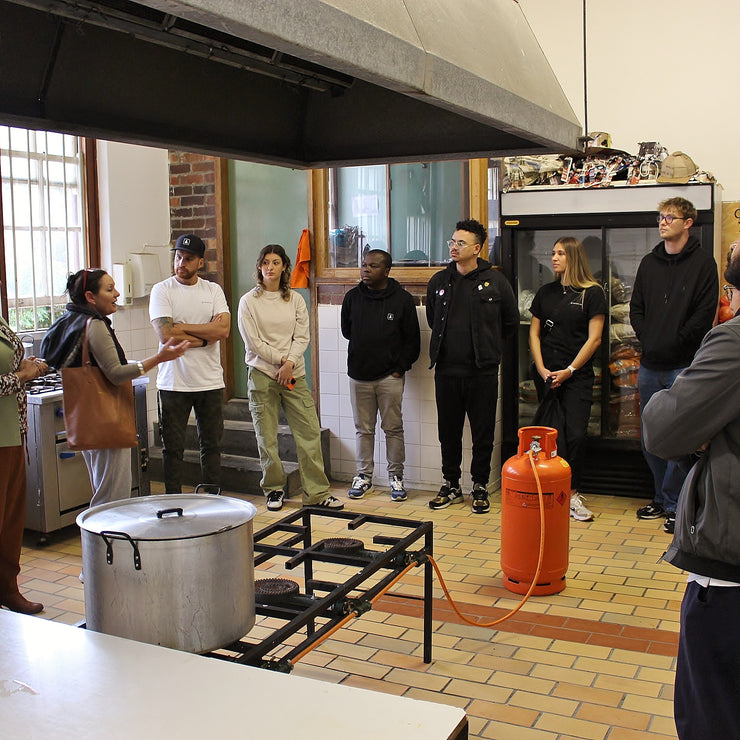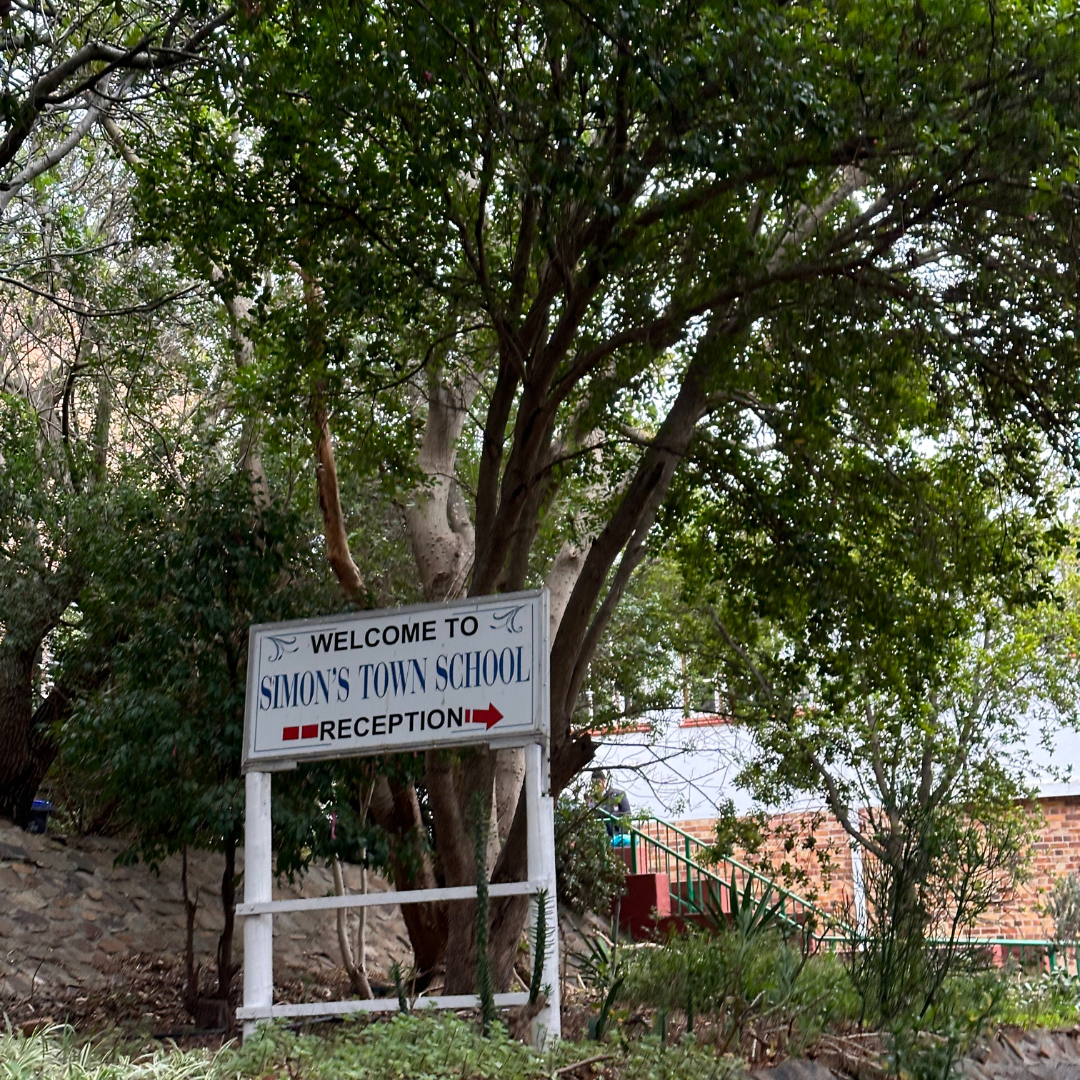"You Can't Teach a Hungry Child"
[ Story ]
Article

Recently, in collaboration with The Peninsula School Feeding Association (PSFA), we expanded our outreach to include Simons Town School, extending our support to an additional 200 children.
Our dedicated LAB team had the privilege of engaging with the school principal, as well as the kitchen staff, to gain insights into the school's unique needs and the invaluable benefits of the feeding program.
Our dedicated LAB team had the privilege of engaging with the school principal, as well as the kitchen staff, to gain insights into the school's unique needs and the invaluable benefits of the feeding program.
PSFA identifies schools where under-privileged children are in desperate need of food. They then equip these schools with kitchens, train personnel, and supply gas and food regularly. Through their efforts, two nutritional meals are being served to these children each day, helping them concentrate in the classroom.


THE HARSH REALITY
In many children's critical and early years, malnutrition is causing a stunt in development. The HIV/AIDS epidemic has devastated families and communities, leaving children orphaned, vulnerable, traumatised, without a breadwinner to provide for them, and alone to head their own households.
Many learners leave very early for school without having eaten breakfast. They come without packed lunches and ask others for food. They are too weak and hungry to pay attention or learn. Many faint in class.
In many children's critical and early years, malnutrition is causing a stunt in development. The HIV/AIDS epidemic has devastated families and communities, leaving children orphaned, vulnerable, traumatised, without a breadwinner to provide for them, and alone to head their own households.
Many learners leave very early for school without having eaten breakfast. They come without packed lunches and ask others for food. They are too weak and hungry to pay attention or learn. Many faint in class.
When a school contacts PSFA and requests inclusion on their feeding programme, an assessment is made. If the school is found eligible and the number of children that need to be fed is determined, PSFA will provide the necessary meal ingredients, cooking equipment and utensils. Dry ingredients are delivered to the school once a month, and fresh vegetables and fruit are delivered weekly.
Volunteers, primarily unemployed women, are recruited from the community by the school, and PSFA provides training on how to prepare and serve the food.





The positive impact
The PSFA feeding program has a multifaceted positive impact.
1. Nutrition: Provides balanced meals, combating malnutrition.
2. Academic Performance: Enhances cognitive function, leading to better academic outcomes.
3. Energy and Productivity: Boosts concentration, increasing productivity and breaking the poverty cycle.
4. Mental Health: Reduces stress and anxiety, promoting overall well-being.
5. Poverty Alleviation: Relieves financial strain on families, improving food security.
6. Crime Reduction: Decreases likelihood of resorting to illegal activities out of necessity.
7. Community Engagement: Fosters social connections and a sense of belonging.
8. Empowerment: Trains volunteers, empowering them with valuable skills and knowledge.
1. Nutrition: Provides balanced meals, combating malnutrition.
2. Academic Performance: Enhances cognitive function, leading to better academic outcomes.
3. Energy and Productivity: Boosts concentration, increasing productivity and breaking the poverty cycle.
4. Mental Health: Reduces stress and anxiety, promoting overall well-being.
5. Poverty Alleviation: Relieves financial strain on families, improving food security.
6. Crime Reduction: Decreases likelihood of resorting to illegal activities out of necessity.
7. Community Engagement: Fosters social connections and a sense of belonging.
8. Empowerment: Trains volunteers, empowering them with valuable skills and knowledge.

"Overcoming poverty is not a task of charity, it is an act of justice" - Nelson Mandela
The Fact:
The latest University of Cape Town report reveals 3 out of 4 children go hungry every day because 30% of our population live in poverty with food insecurity.
The Results: At school - these hungry children are unable to concentrate. Whilst hunger gnaws at them, they can't think about anything else. Or else they simply don't attend school at all.
The Consequence: The deficits of under-nutrition in children becomes irreversible if not addressed. Additional to the disastrous effect of hunger on education and a child’s future, another far-reaching outcome is a generation with poor immune systems, frequent illness, and a link to life-threatening diseases in adult life. Today’s unmet need will have serious consequences for tomorrow, without intervention.
The Answer: To develop into his or her full potential, every child needs regular balanced nutrition across all food groups – protein, carbohydrates, vitamins and minerals. The breakfasts and lunches are designed and prepared accordingly. Daily school meals provide an incentive to attend school, and help children to focus on their studies.
Learn more about PSFA here
The Results: At school - these hungry children are unable to concentrate. Whilst hunger gnaws at them, they can't think about anything else. Or else they simply don't attend school at all.
The Consequence: The deficits of under-nutrition in children becomes irreversible if not addressed. Additional to the disastrous effect of hunger on education and a child’s future, another far-reaching outcome is a generation with poor immune systems, frequent illness, and a link to life-threatening diseases in adult life. Today’s unmet need will have serious consequences for tomorrow, without intervention.
The Answer: To develop into his or her full potential, every child needs regular balanced nutrition across all food groups – protein, carbohydrates, vitamins and minerals. The breakfasts and lunches are designed and prepared accordingly. Daily school meals provide an incentive to attend school, and help children to focus on their studies.
Learn more about PSFA here


[ Follow ]



